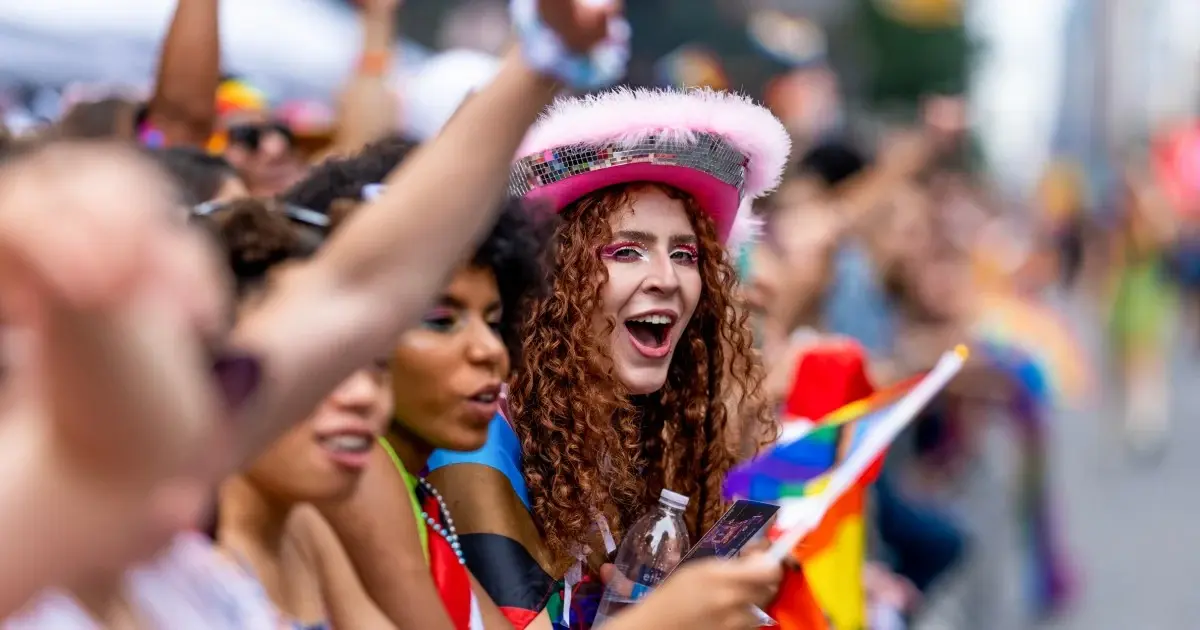I’m fifty. I have known that I am bi since childhood. I lost my virginity with a man a year before I ever had sex with a woman. I can count the friends and family that know I am bi in one hand and I would still not drop the chopstick.
Gen-Z isn’t more queer. Gen-Z just has had the privileged of fearing the closet door less.
The fight against bigotry and homophobia has been slow, long, and arduous, but the progress is undeniable. That’s why you see so much push back now. Some snowflakes quickly melt without the safetynet of their bigoted gender norms.
Absolutely. Older conservatives will tell you that young people are being manipulated into believing they are queer when they are just less afraid to admit that they are. I expect this percentage to keep rising as more bigots die out and eventually plateau in another generation or two.
While I don’t expect bi sexualities to become more common than straight, I do think it will become common enough that the stigma will eventually nearly disappear. There’s a reason my parents don’t know I’m bi but I’ve never felt afraid to tell a gen z person that I am.
It’s great seeing people become more honest and open about themselves.
Reminder that it takes much more effort to try and erase us from society, than to accept us.
🤖 I’m a bot that provides automatic summaries for articles:
Click here to see the summary
More than 1 in 4 Gen Z adults in the U.S. identify as lesbian, gay, bisexual, transgender or queer, dwarfing the percentages of LGBTQ Americans in older age groups, a new survey has found.
“With respect to LGBTQ identity, it’s very clear that Gen Z adults look different than older Americans,” said Melissa Deckman, PRRI’s chief executive.
In its LGBTQ identity breakdown, the report found 72% of Gen Z adults identified as straight, 15% as bisexual, 5% as gay or lesbian and 8% as something else.
In its most recent poll, released in February of last year, Gallup found 7.2% of adults in the U.S. identify as LGBTQ, including nearly 20% of those in Gen Z, which that survey defined as those ages 19 to 26.
Last year, more than 500 anti-LGBTQ bills were introduced in state legislatures around the country, a record, including 75 that were signed into law, according to the American Civil Liberties Union.
“Whether it’s at the polls, in marches and rallies, or online, LGBTQ+ visibility matters and Gen Z is a force for change,” Kelley Robinson, the president of the Human Rights Campaign, the country’s largest LGBTQ advocacy group, said in a statement.
Saved 51% of original text.
Gen Z adults, along with millennials, were also more likely to identify as LGBTQ than Republican, the survey found.
Imagine your child coming out as Republican. I’d be devastated
It’s always been suspected that bisexual people (of varying levels on the Kinsey scale) make up a good half of the population. Combine that with all the other possible LGBTQ sexualities and including trans individuals and you would find even 30% to seem rather low.
From a spectrum point of view, I suspect that something like 100% might be Q, as in everyone having their own combination of places on multiple orthogonal axes of attraction and identity… and that “pure” sexualities are just in denial of some part of themselves.
Paradoxically, it would mean that lacking a full description of someone’s attraction and identity pattern, the closest “sexually” useful description in the sense of matchmaking, would be either that of their genitals, or none at all, with there being better matchmaking predictors that are not sexual.
The rest of labels, would be more of an approximation of one’s tolerance and openness, rather than actual descriptions.
I think we can see some of that in the proliferation of orientation and identity “pride flags”, which seem to have exploded in number, and represent more of a partial personal pattern rather than that of an actual group. It’s still a nice thing to see people freely display their assumed identities, but in the long run I’d expect some systematization and have them classified according to the set of positions on which axes each one represents.
Maybe in some future version of Unicode, there could be a similar encoding to the one used for country flags, which are made of country code letter markers, or the ones for groups of people like 👩👩👧👦 or 👨🏿🤝👨🏼, but for sexual pride flags.
I really don’t like the idea that mono sexualities are just in denial. As a lesbian, there might be fictional men that I like but on real life, I just would rather not be with any guy. And it’s not like I ever tried looking at a guy to see if I find something attractive about him. But I just don’t. Kinda funny how only men that don’t exist appear attractive to me xD And compare that to women and enbies, where I just love everything: their hair, their soft face, their chest, makeup, their cuteness (and sometimes their hotness xD), the way they talk, the things they are most passionate about, and all the NSFW stuff too :D
I understand the experience is not universal, it’s perfectly fine if attraction works for you some other way. But when I analyze my attraction it works two way. First, just the sheer association with women and enbies. I don’t have genital preference, I like women with either equipment, but I would never date (or even be attracted to) a trans man, even if they’re pre-everything. Just the mere fact of knowing they’re a man simply turns me off. And the same applies viceversa: if I learn that someone I know is actually a woman, even if they’re presenting male, no hormones, etc. it’s like my mind opens up the possibility to being attracted to them (even if to a lesser extent). Which brings me to my second point, hormones.
I’ve heard this one from gay men too so I think I’m not alone in this one. When someone is taking E (or T in their case), it’s like everything changes regarding their physiology. Smell, skin, hair texture, shape, to name a few. And smell is a big one to me: manly smell might as well be repellent to me xD, but I know of people attracted to men that it is the entire opposite. And that’s ok! Physiological changes is not something that can’t be ignored for attraction either, after all we really don’t control what makes us tick, our brain is wired to determine what attracts us. I don’t make a conscious decision to find womanly smell attractive, my brain just responds to it positively.
To clarify, I think most people could be bi/pan, I don’t disagree with that. But I disagree that everyone is bi. Or else, how do you explain that throughout history, gay and lesbian people, rather than going the “easy” route and date the opposite gender, dared to date the same gender despite persecution and potentially death? You would probably say something about how they could’ve been bi but they had a very marked preference, but to that I say, isn’t that gay enough?
I see this from another point of view: I think that trying to define a “pure” sexuality, is falling into a No True Scotsman fallacy.
You have described some of your attraction pattern on several axes, and called that “lesbian”. Fine, nobody has the right to tell you otherwise. What I don’t see as clearly, is that it describes a “mono sexuality” or “pure lesbian”.
Sounds to me like you’re defining “lesbian” as “doesn’t get attracted to males, unless they don’t look, smell, or identify as males”… but that still leaves a whole lot of possibilities, while at the same time others might define “lesbian” in some other terms, including whether both people need to meet the same criteria, and that would be their definition of “mono sexuality”.
The point you raise about history, is where I think the labels, as we have them, make more sense: as a transitory means to fight for the rights of people who were otherwise oppressed. It’s a high call to have a heteropatriarhy suddenly become tolerant of all possible sexualities, so fighting for chunks at a time makes more sense. We still shouldn’t lose sight of the end goal, which should be letting everyone be themselves, in all their complexity.
Another interesting thing about history, is that throughout different periods of oppression, there always used to be “roommates” and “travel companions”, who used to share the same bed, behind closed doors. Nowadays some of the most oppressive cultures, still have a similar “out of sight, out of mind” approach. So the fight is more for the right to public expression and social acceptance, which of course benefits from labels, flags, and all the bells and whistles.
Dunno, maybe I’m raising the point too soon, maybe there needs to be another half a century of fighting chunk by chunk, adding more letters and symbols to the LGBTQQIP2SA+ initialism… but I sure wish we could do away with it already, and simply call it “sexuality”.






